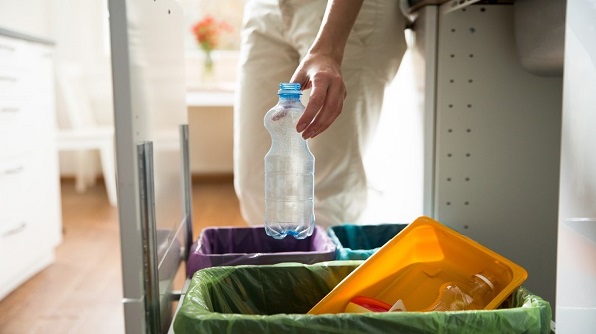
Recycling 101
We’ve done some digging to find out the common mistakes, the secret hacks, and the insider tips on how to recycle like a pro.
29-01-2019
For the latest on this topic, please visit: https://www.coca-colacompany.com/sustainability as this page is no longer current.
Are you recycling correctly? With so many dos, don'ts, and unclear rules, it can be hard to know exactly what goes where. The good news? We’ve done some digging to find out the common mistakes, the secret hacks, and the insider tips on how to recycle like a pro.
If you’re looking to commit to something positive this year, why not make it recycling? It saves energy, reduces landfill, protects wildlife and benefits the economy.
But you already know all that.
What you might not know is exactly how, since there’s a lot of uncertainty over the guidelines. And there are a few big reasons why that is, which is why we thought we’d break it all down for you, and hopefully provide some top tips to make 2020 a greater, greener year…
Facts, stats and myths
It may have taken some time, but the Irish government is now placing a bigger emphasis on recycling than ever – and it’s cracking down on plastic waste in particular. In 2019, Taoiseach Leo Varadkar announced that the government planned to wage a “war on single-use plastics”.
We’re doing our part by working towards the goal of collecting one bottle or can for every one we make by 2030. There’s a definite onus on companies like us to act, but while we concentrate on our efforts to do so, we can all, as individuals, be taking the initiative to do our bit as well.
It’s time to bust some recycling myths.
Ok, let’s bust a few myths. One of the biggest misconceptions about recycling is that you can’t make an impact on an individual basis. But the truth is we’re all responsible, and every little helps – especially when it comes to doing things right.
On that score, there’s myth number two: items made from multiple materials can’t be recycled. They actually can, it just takes a little more effort. With bubble-wrap envelopes, for example, you just have to separate the paper from the plastic, and you’re good to go.
Then there’s the confusion surrounding energy. Some believe that the process of recycling uses up more energy than that which was used to create some products in the first place. But recycling aluminium cans – like the ones we use at Coca‑Cola – actually saves up to 95 percent of the energy needed to make new cans from fresh raw material.
Practical tips
Despite the many recycling myths floating around, awareness for the task at hand is, thankfully, pretty high.
The BBC’s ocean life documentary ‘Blue Planet 2’ created a huge wave of action in the battle against plastic waste. Plastics finding their way into our rivers, oceans and on to our beaches is a global issue, but did you know that the biggest culprits are often tiny?
Knowing what you can and can’t recycle goes a long way
Plastic straws, cotton buds and disposable cups are some of the most common forms of waste that make up the 61 kg of plastic a single person in Ireland will be responsible for each year. Sadly, none of those items can currently be recycled.
So what can? It’s simple really: the telltale sign of an item that can be recycled is that well-known triangular symbol – the one which adorns every product we make (see above for a reminder).
Most of the time, that symbol will be your guide, but if you’re on the hunt for a general recycling cheat sheet, we’ve got you covered with a list of common things you shouldn’t try to recycle:
You can’t recycle:
- Straws
- Coffee cups
- Plastic bags
- Kitchen roll
- Crisp packets
- Non-paper gift wrap
- Soap dispenser tops
- Tissues
- Tissue boxes with the plastic insert attached
- Greasy takeaway boxes
- Laminated foil packaging (like pet/baby food pouches)
- Photo paper
- Post-it notes
- Unwashed food containers
- Unwashed toiletry bottles
But for a comprehensive list of what you can recycle, visit My Waste. There you will also find handy upcycling video tutorials, cold, hard facts to help you convert non-recyclers, and you even have the option to print the list for your home or workplace – in five different languages.
But recycling doesn’t stop with plastics, metals, glass, paper and cardboard. Rather than throw your food away for landfill, for instance, why not deal with it separately using a food waste bin, or turn it into compost? With the latter, you can give your waste food back to the environment by creating fertiliser for your garden.
And beyond food? Practically anything can be recycled in one way or another. Clothes and used household items can be given to charities or online sites like freecycle.org. And if not those, simply ask your friends and family if anyone can give another life to what you’re throwing away!
But, in the end, the big secret to recycling is pretty simple: think about ways you can cut down right at the beginning of the purchasing process for some of life’s everyday essentials.
So instead of buying an undegradable plastic toothbrush, for instance, buy a biodegradable one made from bamboo. And why not place the fruit and veg loose in your shopping basket at the supermarket, rather than wrapping them up in the disposable plastic bags on offer?
These kinds of small changes to your daily routine and shopping habits – particularly when it comes to single-use plastics – can make a world of difference.
In the meantime, be sure to stay tuned to Coca‑Cola Journey for some further myth-busting and top-tips.
